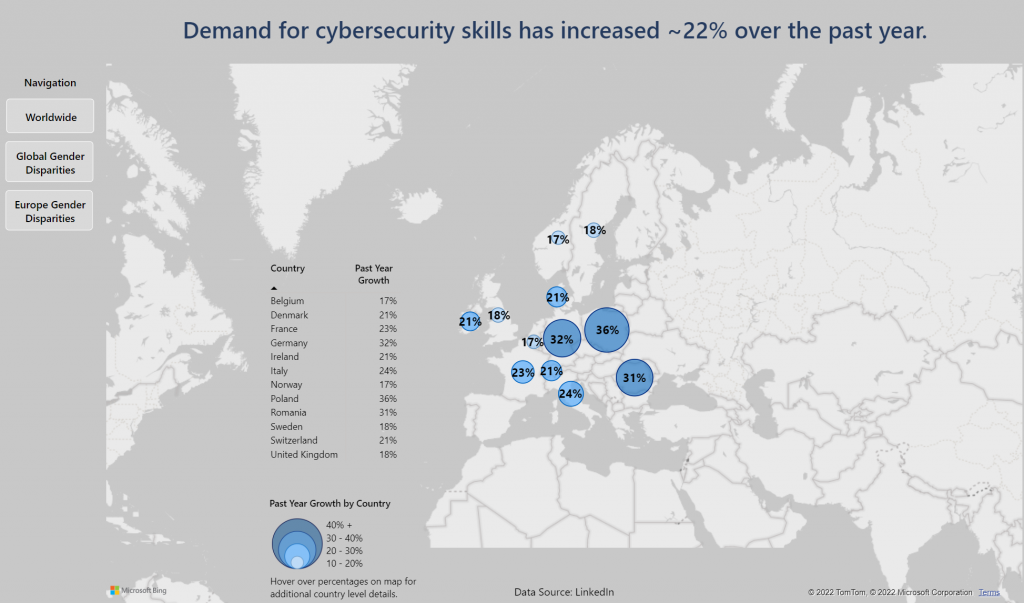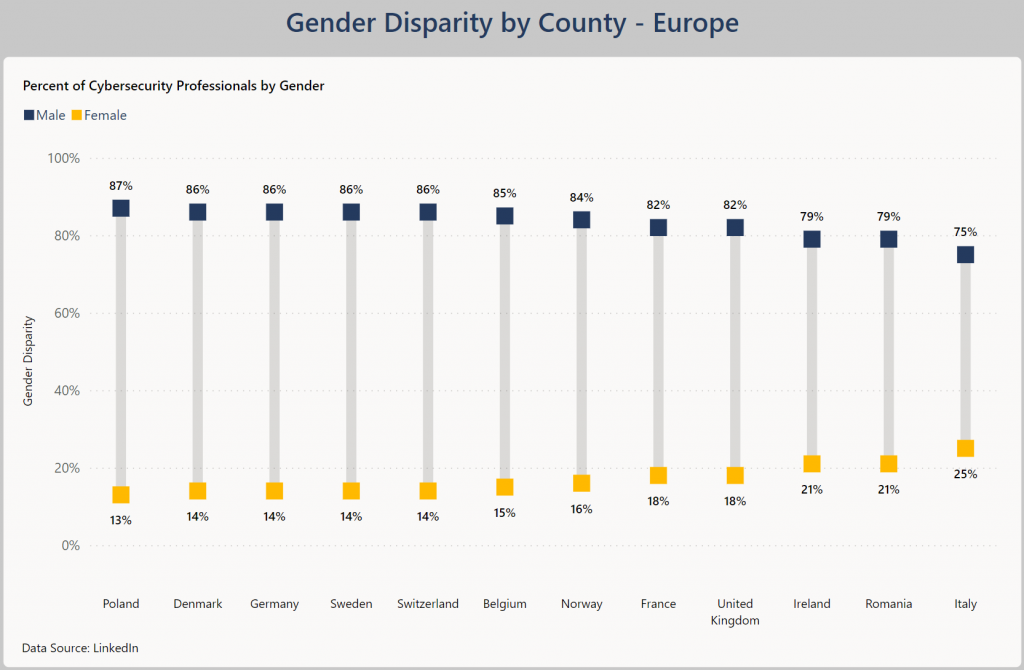Cybersecurity threats are on the rise across the globe, affecting people, businesses, public sector organizations and governments alike. The landscape is no different in Europe where, according to the European Union Agency for Cybersecurity (ENISA), cyberattacks have continued to increase over recent years, not only in terms of numbers and variety, but also in terms of their impact. It appears that this upward trend is continuing into 2022. Just three months into the year and we’ve already seen high-profile cyberattacks on telecommunications networks in Portugal, government servers in Poland and oil facilities in Germany, Belgium and the Netherlands.
With cyber threats increasing in both frequency and complexity, Europe’s accelerating shift to a digital-first economy, and the increasing cybersecurity requirements in European legislation, the need for cybersecurity skilled staff has never been higher. At the same time according to the latest Digital Economic and Social Index (DESI) report, 55% of enterprises continue to report difficulties in recruiting ICT specialists and the cyber-skills shortage is even more pronounced, as the latest report from ENISA makes clear.
Bridging the cyber skills gap
LinkedIn data suggests that the demand for cybersecurity skills has grown by an average of 22% over the last year alone in the 12 European markets we analyzed, with Poland (36%), Germany (32%) and Romania (31%) leading the pack. Across all 12 European countries, at least 60,000 additional cyber professionals are needed to meet the demand next year.
Europe’s cyber-skilling efforts have not been keeping pace with the growing demand for cybersecurity professionals, highlighting an urgent need for both public and private organizations to step up and help bridge the gap. Earlier this year, European Commission Vice President Schinas launched an urgent plea at the 2022 Munich Cyber Security Conference, “to join forces and make concrete pledges to train professionals on cybersecurity skills”.
How we’re supporting cyber skilling in Europe
Today, Microsoft has announced the global expansion of our cybersecurity skills initiative to 23 additional countries around the world, including 12 in Europe: namely Belgium, Denmark, France, Germany, Ireland, Italy, Norway, Poland, Romania, Sweden, Switzerland, and the United Kingdom.
In each of these markets, Microsoft will be working closely with local education institutions, non-profits, governments, and businesses to develop a cybersecurity skills program that fits the unique needs of the market, while expanding access to tools available today. This will include free training for cybersecurity pathways on our LinkedIn Learning platform, as well as more technical skilling opportunities offered through free security courses on our Microsoft Learn platform. In addition, through our partnership with Paris-based Ecole 42 we’ll make Microsoft security content available globally, and through our Microsoft Learn for Educators program, we’ll be better equipping teachers with access to free curriculum, educator training, and tools for teaching cybersecurity students. We are also providing faculty at educational institutions with access to additional resources, including free practice and certification exams, curriculum integration support and more.
Diversity in the cybersecurity workforce
The gender gap is another area where urgent progress is needed. According to the European Commission’s 2021 Women in Digital Scoreboard, only 19% of ICT specialists and about one third of STEM graduates are female. Data from LinkedIn on diversity in the cybersecurity workforce demonstrates that among the 12 European markets our initiative is expanding to, on average only 17% of the cyber workforce is female. The gender disparity is amongst the highest in Poland, where only 13% of the cyber workforce are female, and lowest in Italy, where women make up 25% of the cyber workforce. This data makes it clear that attracting more women to pursue careers in cybersecurity will be key. That’s why we’re launching a partnership with Women in Cybersecurity to expand their student chapters internationally, including in the 12 European markets.
Additionally, together with the Organization for Economic Cooperation and Development (OECD), we will develop a detailed study on how to grow cybersecurity workforces through postsecondary education and make this data publicly available to policymakers and businesses.
We believe that by taking these new steps, in addition to building on our existing European efforts, such as our support for the Youth IGF’s European Cybersecurity Skills Summit, we can make a contribution to bridging the cybersecurity skills gap across Europe. The European Skills Agenda, the Digital Education Action Plan, and the Pact for Skills – which Microsoft joined in November 2020 – also remain important vehicles for mobilizing stakeholders to work together towards the Digital Decade goals by creating more and better training opportunities. The challenge is no less than securing Europe’s digital future. It’s time to get to work.
To learn more about how Microsoft is tackling the cybersecurity skills gap around the world, read our global blog post.



